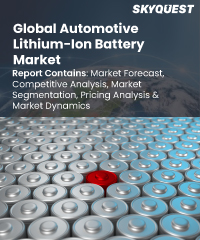
Report ID: SQMIG25A2212

Report ID:
SQMIG25A2212 |
Region:
Global |
Published Date: February, 2024
Pages:
165
|
Tables:
142 |
Figures:
78
Automotive Lithium-Ion Battery Market Driver
Electric vehicles use lithium-ion batteries for electricity. The extensive usage of electric vehicles (EVs) and plug-in hybrid electric vehicles (PHEVs) has undoubtedly increased the adoption of lithium-ion batteries, and this trend is projected to continue. Consumer acceptance of EVs has aided the market for these energy-saving, pollution-reducing vehicles. The popularity of electric vehicles is growing due to benefits such as less need for vehicle engine maintenance, less usage of toxic oil waste, and reduction in pollution caused by fuel combustion engines, as well as the development of new battery technology. Lithium-ion battery demand will gradually rise as more people choose to use electric vehicles, which are seen as the future of the auto industry and transportation networks.
Automotive Lithium-Ion Battery Market Restraint
Non-acceptance of electrical mobility and electro-automotive-solutions could be a restrain in future along with this lack of awareness and alterations of governmental policies in various nations could diminish the demand and hinder growth in some regions.
Spent batteries contain toxic compounds such as acids and heavy metals such as lead and mercury. In July 2007, a fire sparked by lithium-ion batteries destroyed more than 132,000 liters of chemicals, forcing the closure of two major UK highways. It is required to store expended batteries in watertight containers, away from other flammable and combustible objects. As a precautionary measure in the event of a fire, keep a Class D extinguisher and sand nearby. Because used batteries retain residual charge, there is a risk of unintentional discharge, which can cause damage to property and people. Unless correctly labeled, all batteries should be viewed as holding charge and stored with caution.
Our industry expert will work with you to provide you with customized data in a short amount of time.
REQUEST FREE CUSTOMIZATIONAutomotive Lithium-Ion Battery Market size was valued at USD 40.53 billion in 2019 and is poised to grow from USD 48.19 billion in 2023 to USD 228.87 billion by 2031, growing at a CAGR of 18.9% in the forecast period (2024-2031).
Want to customize this report? This report can be personalized according to your needs. Our analysts and industry experts will work directly with you to understand your requirements and provide you with customized data in a short amount of time. We offer $1000 worth of FREE customization at the time of purchase.

Report ID: SQMIG25A2212